Helping Vietnamese agricultural products dominate high-grade market
ABO/NDO – After nearly 10 years of negotiations, in mid-February 2019, Vietnamese mango was officially licensed to enter the US market. This is the sixth fruit of Vietnam available in the US market. Previously, in 2008, dragon fruit was the first fruit from Vietnam to be exported to the US market, followed by lychees, longan, rambutan, and star apple.
 |
| The dragon fruit was the first fruit from Vietnam to be exported to the US market |
After China, the US is currently the second biggest import market of Vietnamese fruit and vegetables, with export turnover of US$ 126 million in 2018. Especially, this is a fastidious market, which requires the world's highest technical standards. For this reason, entering the market also means that Vietnam's agricultural exports have obtained a "passport" to expand opportunities to other high-grade markets.
In recent years, Vietnam's agricultural export turnover has grown rapidly. The export value of agricultural product reached more than US$ 40 billion in 2018. However, according to many economic experts, the figures may be higher if Vietnam’s agricultural products meet the technical standards of import markets, especially in developed countries. Because, although the total export value of Vietnam’s agricultural products reached a high number and ranked 15th in the world in agricultural exports, the growth of the agricultural sector is still evaluated to lack sustainability.
Most of Vietnam’s agricultural products are exported through unofficial channels and only 5% of Vietnamese agricultural products meet international technical standards and are exported to fastidious markets such as the US, European countries, Japan, and the Republic of Korea. Whenever the export through unofficial channels is difficult, the situation of inventory and falling agricultural product prices reoccurs.
In addition, the consultant on GlobalGAP standards - good agricultural practices in Vietnam, said that farmers and agricultural production enterprises in Vietnam have not yet actively approached global cultivation practices from the beginning, or immediately after obtaining the necessary standard certifications, and they do not strictly comply with environmental quality and safety standards. In fact, there are very few Vietnamese agricultural products that can participate in the global supply chain.
In order to continue promoting agricultural exports to fastidious markets, according to economic experts, it is necessary to standardise and raise the quality of goods through good practice according to VietGAP, GlobalGAP, HACCP standards from planting and production stages. In addition, businesses should pay attention to proper investment for packaging, product design, and trademark registration, along with implementation of traceability, to increase value and promote the development of Vietnam's agricultural products. Trade promotion and product promotion are also essential. The State needs to support costs, commercial affairs in foreign countries needed to support information, and connect and introduce Vietnam's key products to the international market. When the issue is well implemented, the export efficiency in the difficult market will surely be increased and the export of agricultural products with the target of US$ 43 billion in 2019 is entirely possible.
(Source: NDO)
.
 về đầu trang
về đầu trang






